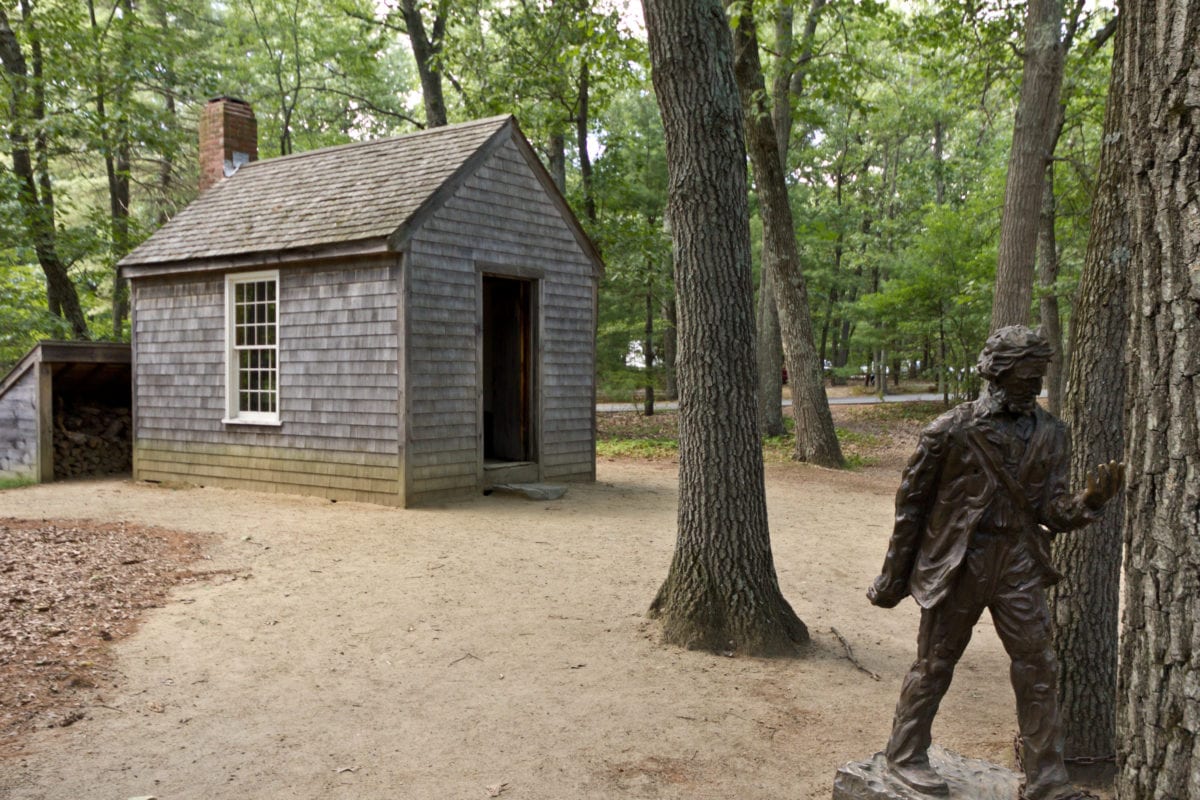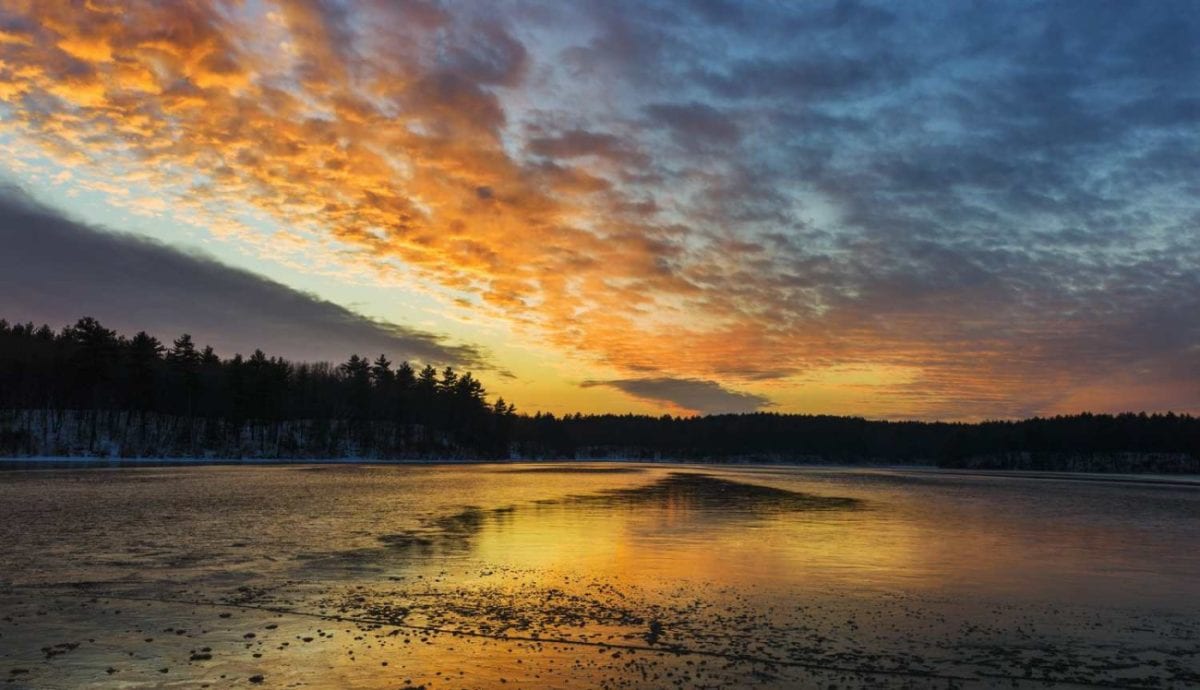By Glynn Wilson –
WASHINGTON, D.C. — Henry David Thoreau is one of the founding fathers of American activism and civil rights as well as science and environmental writing.
Clearly my own life and career are inspired by my own reading of Thoreau. I mean I got rid of most of my worldly possessions about four years ago and embarked on a quest to discover myself in nature and write about the problems of the country while living in national park campgrounds in a camper van. I have written about the environment and civil rights for more than 35 years. You can read about that in my own memoir, Jump On The Bus.
In celebration of the 200th anniversary of Thoreau’s birth in Concord, Massachusetts, NPR interviewed a couple of his biographers on Tuesday.
Kevin Dann, author of a new biography, says Thoreau’s overriding theme of “the sovereignty of the individual” is why the author is more relevant than ever. He cited the surveillance system and police brutality in the U.S., but he could also have been talking about the Trump administration’s roll back of environmental laws and regulations in a time of run amok climate change due to global warming from the burning of fossil fuels.
“Everybody in this country is afraid,” Dann said.
If he were alive today, Thoreau would be “out there (in the streets) and he would (be) shouting from the rafters: People, go into the street! You have no sovereignty anymore,†Dann said. “It is gone.”
As the story goes, Thoreau was only 27 years old when he built a small cabin in 1845 on the shores of Walden Pond near Concord. He spent more than two years hiking in the woods, thinking and writing.
“He figured out that the way to break through into his own way of doing things was to think as he walked,” another biographer, Laura Dassow Walls says.
A professor of English literature at Notre Dame, she has spent her career studying Thoreau. Her new 615-page biography was released Tuesday, coinciding with his 200th birthday on July 12, 1817.
Disgruntled with his life and the state of the nation and world during the industrial revolution, Thoreau set out to live a simple, solitary life. In those woods he wrote two American literary classics, Walden and Civil Disobedience.
Walls said Thoreau scribbled notes in pencil on scraps of paper — descriptions of the sights, sounds, smells and feel of the things around him.
“To do that is to break the wall between ourselves and nature,” she says. “And to understand that we’re always part of nature and nature is always a part of us. So to be here, and to be wholly immersed, to be hot when it’s hot, and cold when it’s cold, to be hearing the birds, and feeding the little mouse that lives under his cabin — is to completely demolish that barrier and understand something really fundamental about what it is to be human.”
Thoreau moved into his 10-by-15-foot cabin on Independence Day in 1845.
“When he moved to his little cabin at the pond he was on a quest for self-discovery … he was declaring his own independence,” says singer-songwriter Don Henley. The Eagles drummer was 22 when he discovered Thoreau in 1969.
“People who were my age in the ’60s were on the same quest,” he says. Walden was a very popular book back then. So I was just seeking spiritually, as Thoreau was, for something to ground me.”
In 1990, Henley founded the Walden Woods Project and raised $20 million to purchase 200 acres of wooded land adjacent to Walden Pond so that it couldn’t fall into the hands of real estate developers. That’s in keeping, Henley believes, with Thoreau’s philosophy.
“He stood up in the face of the Industrial Revolution,” Henley explains. “He said: Wait a minute, wait a minute. We have to slow down, take a look around us, and not destroy what’s left. His famous quote was: ‘In wildness is the preservation of the world.’ It’s difficult to be 150 years of ahead of your time, but he was.”
Thoreau moved to Walden Pond to think through his life, and also the life of the nation, Walls says.
â€He thinks something is going deeply wrong with America — and he’s trying to figure out what is the foundational problem that gives rise to such destructive habits and patterns of life that we could imagine it’s OK to enslave people.”
Reading through his journal, reflections on nature are interspersed with rage-filled entries. Christine Nelson, curator of a Thoreau Bicentenary exhibition at the Morgan Library in New York City, points out one example from 1851, in which Thoreau writes: “Do we call this the land of the free? What is it to be free from King George … and continue the slaves of prejudice?”
The Morgan exhibition includes the author’s handwritten journals (you can see some of them here), along with artifacts from his life. Visitors can see the actual lock from the jail cell where Thoreau spent a night for refusing to pay his taxes to a government that sanctioned slavery, and waged what he considered an illegal war against Mexico. The experience inspired his essay, Civil Disobedience, a tract urging non-violent resistance to unjust laws, that later influenced Mahatma Gandhi and Martin Luther King, Jr.
Back at Walden Pond, Laura Walls points to a sign next to the site where Thoreau built his cabin.
“I went to the woods because I wished to live deliberately, to front only the essential facts of life, and see if I could not learn what it had to teach, and not, when I came to die, discover that I had not lived.”
Thoreau died from tuberculosis in 1862. He was 44.
Thoreau’s works have influenced generations of readers and writers, even though Thoreau himself wasn’t always celebrated. His schoolmates and neighbors found him standoffish and regarded his fascination with plants and Indian relics as downright odd.
According to Maureen Corrigan, a book reviewer for NPR, students come to her office and say, “I don’t know what I want to do with my life.”
“Of course, plenty of people in the world don’t have the luxury of such cluelessness, but my students don’t look like they’re enjoying their privilege; they look scared and depressed, as though they’ve already failed some big test of character. She said they may find some comfort in the life and writings of Thoreau as documented in Michael Sims’ biography of the young Henry David Thoreau called, simply, The Adventures of Henry Thoreau.
While Thoreau is often thought of as poor and homeless, that’s not quite the case. His parents ran a boarding house and a pencil-making business in Concord, and managed to scrape up the tuition to send him to Harvard University. When the 19-year-old Thoreau graduated in 1837, he landed a competitive teaching job in his hometown. But he quit after two weeks because he resented classroom interference by his principal. Throughout his 20s, Thoreau helped out in the family business and worked sporadically as a tutor, a caretaker and even cleaned barns of manure.
Sims says Thoreau mostly lived at home — with the exception of that two-year stretch at Walden Pond — and he was known round Concord as “quirky.”
“How shall I help myself?” The yearning 22-year-old Thoreau scrawled in his journal one night. His answer wasn’t practical, but it was profound. “By withdrawing into the garret,” Thoreau went on to write, “and associating with spiders and mice, determining to meet myself face to face sooner or later.”
Thoreau’s youth seemed aimless to himself and others because there were no available roadmaps for what he was drawn to be: A hands-in-the-dirt intellectual who’s now hailed as the father of “environmentalism”; a philosopher of non-violent resistance whose writing shaped Gandhi and Martin Luther King Jr.
Sims says if Thoreau had committed to a professional career right after Harvard, his parents might have rested easier, but the world would have been poorer.
Yet he did not become known for his writings until long after his death. Why does it have to be that way with some of our greatest artists and writers? I guess you have to be a good self promoter on Facebook these days to get anyone to follow you and to make a living as a writer.
The good news for poor folks who like to read on the web these days and are looking for inspiration is that Thoreau’s works are in the public domain, and now available for free online.
Tom Grill spent two years (the same amount of time Thoreau lived there) photographing Walden Pond with the goal to complete a portfolio that reflected the pond and forest life as Thoreau might have experienced it. See more of his work online here.















